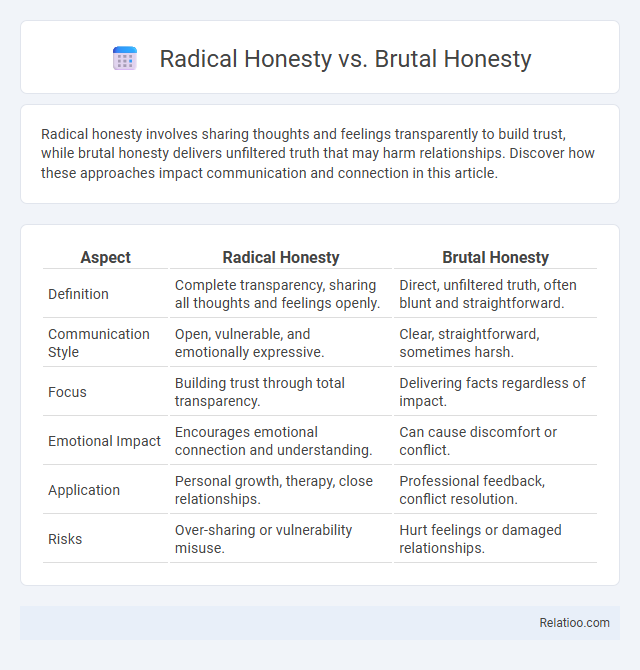Radical honesty involves sharing thoughts and feelings transparently to build trust, while brutal honesty delivers unfiltered truth that may harm relationships. Discover how these approaches impact communication and connection in this article.
Table of Comparison
| Aspect | Radical Honesty | Brutal Honesty |
|---|---|---|
| Definition | Complete transparency, sharing all thoughts and feelings openly. | Direct, unfiltered truth, often blunt and straightforward. |
| Communication Style | Open, vulnerable, and emotionally expressive. | Clear, straightforward, sometimes harsh. |
| Focus | Building trust through total transparency. | Delivering facts regardless of impact. |
| Emotional Impact | Encourages emotional connection and understanding. | Can cause discomfort or conflict. |
| Application | Personal growth, therapy, close relationships. | Professional feedback, conflict resolution. |
| Risks | Over-sharing or vulnerability misuse. | Hurt feelings or damaged relationships. |
Understanding Radical Honesty: Definition and Principles
Radical Honesty is a communication philosophy that emphasizes complete transparency by encouraging individuals to express their true thoughts and feelings without censorship, fostering genuine connections and personal growth. Unlike Brutal Honesty, which can be harsh and insensitive, Radical Honesty focuses on kindness and responsibility in delivering truthful feedback, ensuring your interactions are both honest and compassionate. Understanding these principles helps you build trust, reduce stress, and improve emotional well-being through authentic dialogue.
What Is Brutal Honesty? Key Characteristics
Brutal honesty refers to the practice of speaking the truth in a very direct, unfiltered, and often harsh manner, prioritizing bluntness over tact. Key characteristics include a straightforward communication style, a disregard for the potential emotional impact on others, and an emphasis on absolute transparency regardless of social sensitivity. Unlike radical honesty, which balances truth-telling with empathy and personal accountability, brutal honesty can sometimes come across as insensitive or confrontational.
Radical Honesty vs Brutal Honesty: Core Differences
Radical Honesty emphasizes complete transparency paired with empathy, encouraging open emotional expression to foster genuine connections, while Brutal Honesty often delivers truth without filtering, risking emotional harm or conflict. You benefit from Radical Honesty by creating trust and authenticity in relationships, as it values compassion alongside honesty. The core difference lies in Radical Honesty's intent to heal and understand versus Brutal Honesty's blunt, sometimes insensitive communication style.
The Psychology Behind Radical Honesty
Radical Honesty involves openly expressing thoughts and feelings without filtering, aiming for genuine connection and emotional liberation according to psychologist Brad Blanton's principles. This approach contrasts with Brutal Honesty, which often disregards others' feelings and can lead to harm rather than healing. The psychology behind Radical Honesty highlights how vulnerability and transparency reduce anxiety and build trust by fostering authentic interpersonal relationships.
Emotional Impact: Radical vs Brutal Approaches
Radical Honesty fosters deeper emotional connections by encouraging transparency and vulnerability, allowing individuals to express feelings authentically without fear of judgment. Brutal Honesty, while straightforward, often prioritizes blunt truth over emotional sensitivity, which can lead to hurt feelings and strained relationships. The emotional impact of Radical Honesty typically promotes trust and understanding, whereas Brutal Honesty can provoke defensiveness and emotional harm due to its unfiltered nature.
Communication Styles and Relationship Outcomes
Radical Honesty promotes transparent communication by encouraging individuals to express their true feelings and thoughts without filtering, fostering deeper trust and emotional intimacy in relationships. Brutal Honesty, often characterized by directness without regard for the listener's feelings, can lead to misunderstandings or hurt, potentially damaging relational bonds despite its apparent candor. Your choice between these communication styles significantly impacts relationship outcomes, as Radical Honesty supports empathetic dialogue and growth, whereas Brutal Honesty risks alienating others due to its bluntness.
Pros and Cons of Practicing Radical Honesty
Radical honesty promotes transparent and unfiltered communication, fostering deeper trust and authenticity in relationships by encouraging individuals to share their true thoughts and feelings openly. However, this practice may lead to conflicts or hurt feelings due to its lack of tact and sensitivity, potentially damaging social bonds if not balanced with empathy. Practicing radical honesty requires self-awareness and emotional intelligence to navigate the fine line between truthful expression and respectful interaction effectively.
Risks and Consequences of Brutal Honesty
Brutal honesty, characterized by unfiltered and often harsh truth-telling, risks damaging relationships due to its potential to hurt others' feelings and provoke defensiveness. Unlike Radical Honesty, which emphasizes transparency combined with empathy and accountability, Brutal Honesty can lead to social isolation and conflict because it often disregards the listener's emotional state. Consequences of Brutal Honesty include loss of trust, breakdown in communication, and increased interpersonal tension.
When to Use Radical Honesty vs Brutal Honesty
Radical Honesty involves full transparency and sharing truthful feelings without filters to foster deep trust and authentic relationships, best used in close personal or therapeutic settings where vulnerability is safe. Brutal Honesty prioritizes directness and truth delivery, often without regard for the recipient's feelings, making it suitable in situations demanding urgent clarity or performance feedback. Choosing when to use Radical Honesty vs Brutal Honesty depends on the context: Radical Honesty suits environments prioritizing emotional depth, while Brutal Honesty fits scenarios requiring unambiguous, straightforward communication.
Tips for Applying Honest Communication Effectively
Applying honest communication effectively involves understanding the distinctions between Radical Honesty, Brutal Honesty, and Radical Honesty principles; Radical Honesty emphasizes complete transparency with empathy to maintain trust, while Brutal Honesty risks harming relationships through unfiltered truth. Tips include practicing active listening, framing feedback constructively, and balancing honesty with emotional sensitivity to avoid unnecessary conflict. Maintaining open body language and verifying understanding can further ensure that candid communication strengthens rather than damages interpersonal connections.

Infographic: Radical Honesty vs Brutal Honesty
 relatioo.com
relatioo.com